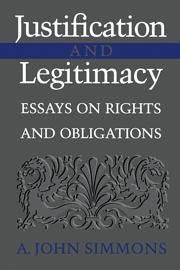Book contents
- Frontmatter
- Contents
- Introduction
- Acknowledgments
- 1 The Principle of Fair Play
- 2 Fair Play and Political Obligation: Twenty Years Later
- 3 The Obligations of Citizens and the Justification of Conscription
- 4 Associative Political Obligations
- 5 External Justifications and Institutional Roles
- 6 Philosophical Anarchism
- 7 Justification and Legitimacy
- 8 “Denisons” and “Aliens”: Locke's Problem of Political Consent
- 9 Human Rights and World Citizenship: The Universality of Human Rights in Kant and Locke
- 10 Original-Acquisition Justifications of Private Property
- 11 Historical Rights and Fair Shares
- 12 Makers' Rights
- Index
4 - Associative Political Obligations
Published online by Cambridge University Press: 05 June 2012
- Frontmatter
- Contents
- Introduction
- Acknowledgments
- 1 The Principle of Fair Play
- 2 Fair Play and Political Obligation: Twenty Years Later
- 3 The Obligations of Citizens and the Justification of Conscription
- 4 Associative Political Obligations
- 5 External Justifications and Institutional Roles
- 6 Philosophical Anarchism
- 7 Justification and Legitimacy
- 8 “Denisons” and “Aliens”: Locke's Problem of Political Consent
- 9 Human Rights and World Citizenship: The Universality of Human Rights in Kant and Locke
- 10 Original-Acquisition Justifications of Private Property
- 11 Historical Rights and Fair Shares
- 12 Makers' Rights
- Index
Summary
If we owe to [civil society] any duty, it is not subject to our wills. Duties are not voluntary.… The awful Author of our being is the Author of our place in the order of existence.… He has in and by that disposition virtually subjected us to act the part which belongs to the place assigned us.… Parents may not be consenting to their moral relation; but, consenting or not, they are bound to a long train of burdensome duties towards those with whom they have never made a convention of any sort. Children are not consenting to their relation; but their relation, without their actual consent, binds them to its duties.… So, without any stipulation on our own part, are we bound by that relation called our country.… The place that determines our duty to our country is a social, civil relation.… The place of every man determines his duty.
With the possible exception of his reference to the “Author of our being,” Edmund Burke's words would not seem out of place in the writings of any number of contemporary authors writing on the problem of political obligation. Ronald Dworkin, for instance, claims in Law's Empire that “political obligation … is a form of associative obligation,” a kind of moral requirement that he also refers to as a “communal obligation” or an “obligation of role.”
- Type
- Chapter
- Information
- Justification and LegitimacyEssays on Rights and Obligations, pp. 65 - 92Publisher: Cambridge University PressPrint publication year: 2000

